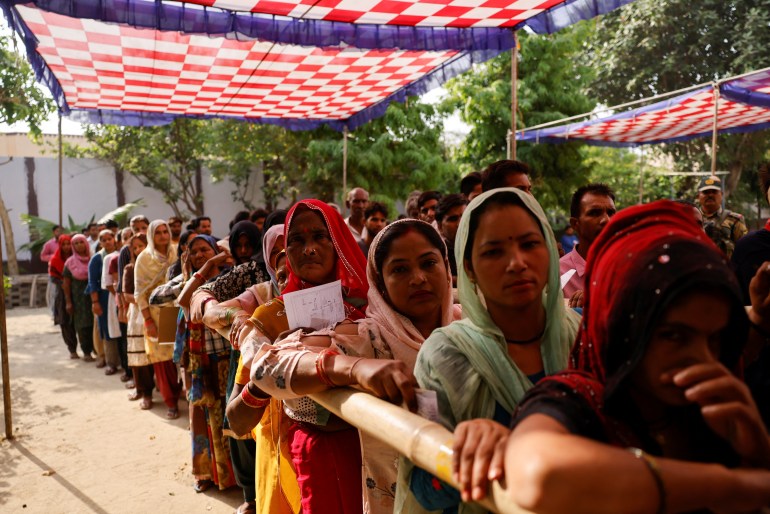Prime Minister Narendra Modi was among millions of voters in 93 constituencies who went to the polls in the third phase of India’s mammoth general elections.
The world’s most populous country began voting on April 19 in a seven-stage election in which nearly a billion people are eligible to vote. The counting of the ballot papers is scheduled for June 4th.
Tuesday’s poll covered 93 seats in 11 states and union territories, with Gujarat and Maharashtra in the west and Karnataka in the south accounting for 50 seats. This means that 283 of 543 seats for the Lok Sabha, as the lower house of the Indian Parliament is called, were awarded.
Modi, 73, is seeking a rare third consecutive term pitting his Hindu nationalist Bharatiya Janata Party (BJP) against an alliance of more than two dozen opposition parties led by the Indian National Congress.
Modi cast his vote from Gandhinagar constituency in the home state of Gujarat, where his number two, Home Minister Amit Shah, is the BJP candidate.
He called on citizens to actively participate in the “Celebration of Democracy” while taking care of their health as summer temperatures continue to rise in many parts of the country.
Dressed in saffron and white, he was surrounded by hundreds of supporters and party members who signed autographs and talked to children on the way to the polling station.
Modi changed his campaign strategy after the first phase of voting and focused more on energizing the BJP’s Hindu base by describing rivals as pro-Muslim, even though a poll showed jobs and inflation were voters’ top concerns.
In his public speeches, he referred to Muslims as “infiltrators” and “those who have more children”, causing India’s over 220 million Muslim population to become increasingly concerned about their future in the country.
The statements also sparked condemnation from opposition politicians, who complained to electoral authorities.
“Not against Islam or Muslims”
In an interview with Times Now broadcast on Monday, Modi said he was not an opponent of Islam or Muslims and wanted the community to think about its future growth when voting.
“We are not against Islam. We are not against Muslims. This is not our domain,” he said. “She [opposition] would denigrate us as anti-Muslims and then claim that they are friends of Muslims. This is how they won. That’s why they created this atmosphere of fear. They benefited from the scaremongering. But the Muslim community is now aware of this.”
Modi added: “Please check. Think. The country is making progress. If your community feels disadvantaged, what is the reason? Why didn’t you take advantage of government programs when Congress was in power?”
Hartosh Singh Bal, editor-in-chief of news magazine The Caravan, said it was the first time in a long time that Modi had been so direct in his statements about Muslims.
“I’ve never seen him so directly bigoted, he usually alludes to bigotry,” he said. “The wealth redistribution comments target something in the congressional manifesto that simply doesn’t exist and that’s quite unfortunate, frankly.”
Ali Khan Mahmudabad, a professor of political science at Ashoka University in New Delhi, said changes in the BJP’s campaign could also be a sign of concern over low voter turnout, which it had not expected.
“The mask has fallen and I think it is political compulsions that have made it so,” he said.
“In the recent elections, the BJP’s victories were linked to voter disenfranchisement [to vote]said Mahmudabad. “There could be some fatigue, anti-incumbency or even disillusionment,” which has led the BJP to sharpen its rhetoric.

India’s elections will be conducted over a period of six weeks to ease the immense logistical burden involved in conducting the democratic exercise across a vast country. Meanwhile, much of South Asia is experiencing a heatwave that resulted in several constituencies voting in scorching temperatures.
In the city of Mathura, a three-hour drive from New Delhi, temperatures topped 41 degrees Celsius on polling day and Election Commission figures showed voter turnout fell almost nine percentage points to 52 percent compared to five years earlier.
Journalist Sravasti Dasgupta told Al Jazeera that voter turnout in the current elections had seen a “significant decline” compared to 2019.
“In the first two phases, voter turnout was around 66 percent. In comparison, in 2019, voter turnout was 69 percent in the same two phases,” said Dasgupta, who works for The Wire, an independent news website.
“Many reasons are cited, such as the fact that most parts of the country are experiencing a severe heat wave as we are in the middle of summer here in India.”
India’s Meteorological Department has predicted more hot spells in May and the Election Commission last month formed a working group to examine the impact of heat and humidity ahead of each round of voting.
